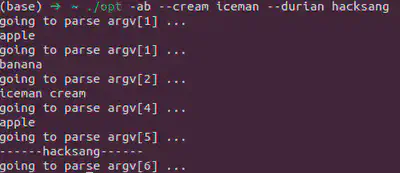getopt_long in C language
C语言getopt_long函数
 Image credit: Unsplash
Image credit: Unsplash在linux中,经常需要各种命令,通常情况下都会带各种参数,而这些参数是如何解析的呢?通常使用GNU C提供的函数getopt、getopt_long、getopt_long_only函数来解析命令行参数。
getopt_long函数
getopt函数只能处理短选项,而getopt_long函数两者都可以,可以说getopt_long已经包含了getopt_long的功能。因此,这里就只介绍getopt_long函数。
#include <unistd.h>
int getopt(int argc, char * const argv[],
const char *optstring);
extern char *optarg;
extern int optind, opterr, optopt;
#include <getopt.h>
int getopt_long(int argc, char * const argv[],
const char *optstring,
const struct option *longopts, int *longindex);
argc: main函数的参数
argv: main函数的参数
optstring: 表示短选项字符串。 形式如
a🅱️💿,分别表示程序支持的命令行短选项有-a、-b、-c、-d,冒号含义如下:- 只有一个字符,不带冒号——只表示选项, 如-c
- 一个字符,后接一个冒号——表示选项后面带一个参数,如-a 100
- 一个字符,后接两个冒号——表示选项后面带一个可选参数,即参数可有可无, 如果带参数,则选项与参数直接不能有空格
longopts:表示长选项结构体, longopts is a pointer to the first element of an array of struct option declared in <getopt.h> as
struct option { const char *name; int has_arg; int *flag; int val; };- name:表示选项的名称
- has_arg:表示选项是否携带参数,该参数有下面三个不同的值
- no_argument(或者是0)时 ——参数后面不跟参数值,eg: –version,–help
- required_argument(或者是1)时 ——参数输入格式为:–参数 值 或者 –参数=值。eg:–dir=/home
- optional_argument(或者是2)时 ——参数输入格式只能为:–参数=值
- flag:
- 如果为NULL,当存在长选项时,返回val。
- 不为NULL,当存在长选项,返回0,将flag指针指向的对象设置为val值。
- val:找到选项的返回值,通常用来和短选项的值保持一致。
longindex:非空时,它指向的变量将记录当前找到参数符合longopts里的第几个元素的描述,即是longopts的下标值。
该头文件还存在几个全局变量供使用:
- optarg:选项对应的参数值
- optind:下一个将被处理到参数在argv中的下标值
- opterr
- optopt:未被标识的选项
返回值
- 如果短选项找到,那么将返回短选项对应的字符。
- 如果长选项找到,如果flag为NULL,返回val。如果flag不为空,返回0
- 如果遇到一个选项没有在短字符、长字符里面。或者在长字符里面存在二义性的,返回“?”
- 如果解析完所有字符没有找到(一般是输入命令参数格式错误,eg: 连斜杠都没有加的选项),返回“-1”
- By default, getopt() permutes the contents of argv as it scans, so that eventually all the nonoptions are at the end. Two other modes are also implemented. If the first character of optstring is ‘+’ or the environment variable POSIXLY_CORRECT is set, then option processing stops as soon as a nonoption argument is encountered. If the first character of optstring is ‘-’, then each nonoption argv-element is handled as if it were the argument of an option with **character code 1.**此时遇到非option的参数,会返回1,我们可以用optarg参数来获取该字符串。
测试用例
#include <stdio.h>
#include <getopt.h>
int main(int argc, char *argv[]) {
const struct option table[] = {
{"apple", no_argument, NULL, 'a'},
{"banana", no_argument, NULL, 'b'},
{"cream", required_argument, NULL, 'c'},
{"durian", no_argument, NULL, 'd'},
{0, 0, 0, 0}
};
int o;
printf("going to parse argv[%d] ...\n", optind);
while((o = getopt_long(argc, argv, "-abc:d", table, NULL)) != -1) {
switch(o) {
case 'a':
printf("apple\n");
break;
case 'b':
printf("banana\n");
break;
case 'c':
printf("%s cream\n", optarg);
break;
case 'd':
printf("apple\n");
break;
case 1:
printf("------%s------\n", optarg);
break;
default:
printf("cannot reach here\n");
}
printf("going to parse argv[%d] ...\n", optind);
}
return 0;
}
测试结果如下:
